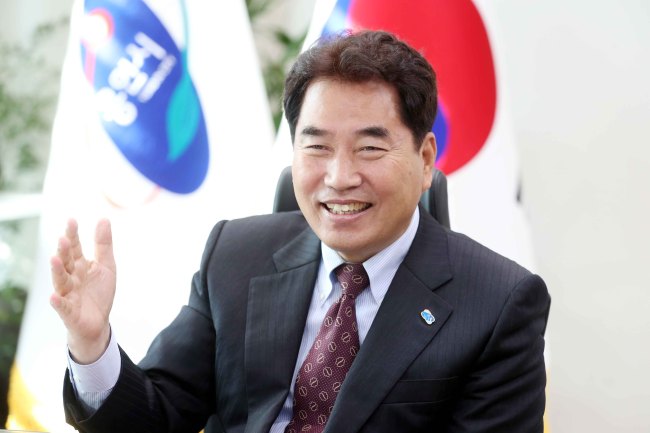Yongin to focus efforts on hosting semiconductor cluster
By Ock Hyun-juPublished : Jan. 27, 2019 - 15:37
Yongin, located in Gyeonggi Province some 40 kilometers south of Seoul and home to some 1 million people, is the most ideal city to host a semiconductor cluster, given its proximity to Seoul and personnel well-equipped with expertise in the industry, Mayor Baek Kun-ki said in an interview.
“Yongin city will focus its administrative efforts on creating a semiconductor cluster,” he said.
“Yongin city will focus its administrative efforts on creating a semiconductor cluster,” he said.

In December, the Ministry of Trade, Industry and Energy announced a plan to create a semiconductor cluster, which will house both big-name chipmakers and small and medium-sized parts makers to boost synergy in the semiconductor industry.
SK hynix plans to invest some 120 trillion won ($107 billion) in the project in the next 10 years.
The move is expected to generate more than 10,000 jobs and have a multitrillion-won ripple effect on the economy.
Competition is heating up among municipalities -- Yongin and Icheon in Gyeonggi Province, Cheongju in North Chungcheong Province, South Chungcheong Province and Gumi in North Gyeongsang Province -- to host the cluster for semiconductors.
Yongin is already home to Samsung Electronics’ semiconductor plant.
New, human-centered city
Yongin city’s efforts to host the semiconductor cluster is in line with Mayor Baek’s vision to generate jobs so that the livelihoods of citizens can improve overall.
However, his vision is not limited to attracting the manufacturing cluster.
He hopes to make Yongin “human-centered and new,” where citizens’ interests and well-being come before companies’ interests, he said.
“Last year, we paved the way to make Yongin human-centered and new. This year, based on this, we will begin to realize the promises we made with our citizens,” he said, asking all members of Yongin to “go back to basics.”
Entering seven months since he took office, the municipality laid the groundwork last year for a policy shift toward respecting the marginalized in the city.
The municipality overhauled committees to fill them with those who prioritize human values, as well as its governing systems, to offer high-quality administrative services.
“We comprehensively reformed each committee, including a city-planning committee, by filling them with those who put priority on people, and made a big shift toward the direction focusing on humans in terms of housing and transportation policies,” he said.
Under his leadership, a special investigation committee was created to find the cause and result of indiscriminate urban development projects and devise measures to stop the trend.
This was a result of self-reflection that Yongin had rapidly expanded due to reckless development projects, which caused urban problems and an imbalance between development and environmental protection, he said.
“The activities of the special committee on preventing reckless development significantly changed public servants’ awareness of urban development. The committee has also served as a communication channel to prevent reckless development between private and public sectors,” he said.
The committee’s term will end in February. That month, the city will publish a white paper including alternatives and policies that working-level officials could review and refer to in their everyday work.
“The city will set its own, new standards for the city’s development and revise relevant laws and institutions,” he said.
For Yongin citizens at the fringes of society, the city increased the budget for social welfare by 15 percent, compared to the previous year.
It plans to strengthen welfare services provided by community centers. Care services for some 3,500 elderly in the city will be expanded and housing renovation will also be broadened for the less-abled and low-income families, according to Baek.
Seven policy objectives
As Baek was sworn in office, he laid out seven policy goals to implement during his term.
Baek vowed to make Yongin “smart” in terms of transportation; eco-friendly without reckless urban development; self-sufficient in terms of economy; abundant in terms of culture, art and tourism; welfare-friendly; child care-friendly; and trustworthy.
While it is not easy to determine which policy goal is more important, he said his priority would be on expanding railways and road systems, creating jobs for youths, constructing a “Yongin Platform City” to revitalize the regional economy and expanding welfare.
“An opening of a road has a big impact on citizens’ lives. In Yongin, there are many places where changes are needed,” he said. “Railways, which are the foundation of public transport, have to be expanded as well.”
For example, the city secured 500 million won to pave the 6.9-kilometer road between Namsa and Dongtan. It is in consultation with the central government to win more funds to construct other roads connecting major spots in and out of the city.
He also floated his plan to extend the Bundang line from Giheung Station to Osan Station on Line No. 1, among other plans to expand the rail system in Yongin.
Under Baek’s administration, the city’s efforts, especially in disaster management and innovation in regulations, were rewarded with several awards, including two presidential commendations, as well as financial incentives worth 460 million won.
By Ock Hyun-ju & Park Joung-kyu (laeticia.ock@heraldcorp.com) (fob140@heraldcorp.com)
-
Articles by Ock Hyun-ju







![[From the Scene] Monks, Buddhists hail return of remains of Buddhas](http://res.heraldm.com/phpwas/restmb_idxmake.php?idx=644&simg=/content/image/2024/04/19/20240419050617_0.jpg&u=20240419175937)








![[From the Scene] Monks, Buddhists hail return of remains of Buddhas](http://res.heraldm.com/phpwas/restmb_idxmake.php?idx=652&simg=/content/image/2024/04/19/20240419050617_0.jpg&u=20240419175937)

![[KH Explains] Hyundai's full hybrid edge to pay off amid slow transition to pure EVs](http://res.heraldm.com/phpwas/restmb_idxmake.php?idx=652&simg=/content/image/2024/04/18/20240418050645_0.jpg&u=20240419100350)

![[Today’s K-pop] Illit drops debut single remix](http://res.heraldm.com/phpwas/restmb_idxmake.php?idx=642&simg=/content/image/2024/04/19/20240419050612_0.jpg&u=)